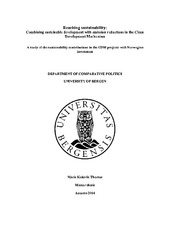| dc.contributor.author | Thorsen, Marie Koksvik | eng |
| dc.date.accessioned | 2015-01-02T13:17:32Z | |
| dc.date.available | 2015-01-02T13:17:32Z | |
| dc.date.issued | 2014-11-20 | eng |
| dc.date.submitted | 2014-11-20 | eng |
| dc.identifier.uri | https://hdl.handle.net/1956/9060 | |
| dc.description | Revised version: Acknowledgements added | en_US |
| dc.description.abstract | This thesis investigates how projects of The Clean Development Mechanism (CDM) contribute to sustainable development. These are projects with the dual objective of reducing greenhouse gas emissions and contribute to sustainable development. As these projects' contributions to sustainable development vary considerably, this thesis investigates combinations of factors in order to explain these variations. Which factors are decisive for obtaining substantial or unsubstantial contributions to sustainable development are assessed by using Qualitative Comparative Analysis (QCA) as a research method. QCA is a combinatorial method and was used in order to find combinations of factors that affected the projects contributions to sustainable development. The 85 CDM projects with Norwegian investment were used as a sample, and five explanatory variables, the conditions, were used for investigating how the outcome for the projects contributions varied. Three of the conditions were related to the project design while two conditions were related to the project participants. It was a purpose of the thesis to compare the relevance of these two types of conditions for explaining the projects' outcomes. The project design variables were Project Category, Project Scale and the Emission reductions generated from a project while the project participant conditions were Ownership type and Economic performance of the host country of a project. The project design conditions appeared to be less relevant for explaining the outcome than the conditions of the project participants. The Project category and the Emission reductions generated from a project both appeared relevant for explaining the outcome, while the Project Scale appeared to be irrelevant. The findings suggested that the Ownership type of the projects was the most decisive factor for explaining the project's contributions to sustainable development, although the Economic performance of the host country of a project seemed decisive for which ownership type the projects would have. However, also country specific contexts seem to explain some of the variations in the outcomes among the projects. | en_US |
| dc.format.extent | 1037758 bytes | eng |
| dc.format.mimetype | application/pdf | eng |
| dc.language.iso | eng | eng |
| dc.publisher | The University of Bergen | eng |
| dc.subject | Sustainable development | eng |
| dc.subject | development politics | eng |
| dc.subject | Climate change | eng |
| dc.title | Reaching sustainability: Combining sustainable development with emission reductions in the Clean Development Mechanism. A study of the sustainability contributions in the CDM projects with Norwegian investment | eng |
| dc.type | Master thesis | en_US |
| dc.rights.holder | Copyright the author. All rights reserved | en_US |
| dc.description.degree | Master i Sammenliknende politikk | |
| dc.description.localcode | SAMPOL350 | |
| dc.description.localcode | MASV-SAPO | |
| dc.subject.nus | 731114 | eng |
| fs.subjectcode | SAMPOL350 | |
